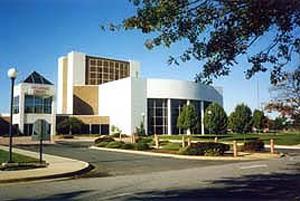WYE MILLS – Chesapeake College has been awarded a $122,000 Early College Innovation Fund grant by the Maryland State Department of Education to partner with Caroline County Public Schools in an initiative directed at high school students studying in health-related career fields.
The goal is for students who participate in the program to earn at least 30 college credits that can be applied to health profession majors at Chesapeake College or four-year institutions. The grant provides funding for marketing and student recruitment, selection and support of a student cohort, and development of a college biomedical technology curriculum that will serve as one career option for participants.
“We’ve very excited to have been awarded this highly competitive grant,” said Dr. Barbara Viniar, Chesapeake College’s president. “And we’re thrilled to be partnering with Caroline County Public Schools on another Dual Enrollment initiative. This fits very well with the Roberta Holt Dual Enrollment Grant that is providing CCPS Dual Enrollment students with increased access to college courses.”
Students accepted into the program – called the Upper Shore Early College Initiative (ECI) – will be able to apply for funding from the Holt Dual Enrollment Grant. The Holt Grant – which is open to all CCPS Dual Enrollment students, not just those participating in ECI – provides up to $25,000 per semester ($500 per course up to $1,000 per student) to assist CCPS Dual Enrollment students with tuition, fees and books for their college classes. The grant, administered by the Mid-Shore Community Foundation, began during the Spring 2013 semester.
Dr. Khalid Mumin, Caroline County superintendent of schools, also lauded the benefits of the MSDE grant and partnership with Chesapeake College.
“This will offer our students in health-related fields an excellent opportunity to get a jump start on their college education,” said Dr. Mumin. “The academic programs involved in this initiative will prepare our students for high-paying careers in growing career fields that will feature local employment opportunities.”
Chesapeake and CCPS will begin recruiting next month for the program, which is designed for high school juniors and seniors and set to start next fall. The first cohort of at least 16 students will be selected from this year’s sophomores at North Caroline and Colonel Richardson high schools in health-related programs – “a pool of nearly 100 students,” according to Dr. Theresa Stafford, CCPS’s supervisor of college and career readiness.
“We will start the process with in-school general interest meetings conducted jointly by Chesapeake and CCPS with all eligible students,” said Dr. Stafford. “We will then have more detailed information sessions at Chesapeake with students who express an interest in applying for this program along with their parents.”
All applicants will take the Accuplacer assessment, which Chesapeake uses to determine students’ college readiness. A selection committee comprised of representatives from the college, school system and advisory committee expects to select the first cohort next April. Additional participants may be admitted next summer as space allows.
Students will have the option to study toward degrees in biomedical technology, radiological sciences and general college studies/allied health.
“We’re very excited about this partnership and the opportunity to help Caroline County students work toward earning college degrees in these fields in a very accelerated time frame,” said Maureen Gilmartin, the college’s dean for career and professional studies, and the project director for the grant.
Gilmartin said the college hopes to expand the partnership to other counties in Chesapeake’s service region at a future date.
Notes: The general interest meetings for eligible students will be November 5th at North Caroline High and November 7th at Colonel Richardson High. Both meetings will take place at 8:30 a.m. in the respective schools’ auditoriums. Students should contact their high school counselors for more information.
.



Write a Letter to the Editor on this Article
We encourage readers to offer their point of view on this article by submitting the following form. Editing is sometimes necessary and is done at the discretion of the editorial staff.